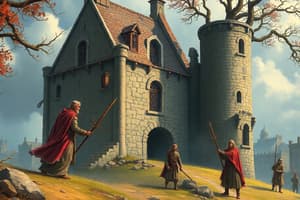Podcast
Questions and Answers
Which literary period emphasized emotion and individualism?
Which literary period emphasized emotion and individualism?
- Age of Enlightenment
- Renaissance
- Anglo-Saxon period
- Romanticism (correct)
Who wrote the famous work 'Beowulf'?
Who wrote the famous work 'Beowulf'?
- William Shakespeare
- Charles Dickens
- Geoffrey Chaucer
- Anonymous poet in the Anglo-Saxon period (correct)
Which literary era saw a focus on rationalism and critique of society?
Which literary era saw a focus on rationalism and critique of society?
- Victorian era
- Romanticism
- Renaissance
- Age of Enlightenment (correct)
Who is known for their intricate plots and memorable characters in Victorian literature?
Who is known for their intricate plots and memorable characters in Victorian literature?
Which literary period saw a surge in interest in classical literature?
Which literary period saw a surge in interest in classical literature?
Who is associated with courtly literature in the medieval period?
Who is associated with courtly literature in the medieval period?
What distinguishes literary fiction from other genres?
What distinguishes literary fiction from other genres?
Which major literary movements emerged in the 20th century?
Which major literary movements emerged in the 20th century?
How does literature contribute to English education?
How does literature contribute to English education?
What is one of the impacts of literature on society?
What is one of the impacts of literature on society?
Which authors challenged literary conventions in the 20th century?
Which authors challenged literary conventions in the 20th century?
What does literary fiction often explore?
What does literary fiction often explore?
Flashcards are hidden until you start studying
Study Notes
English: A Journey through Literature
English is more than just a language — it's a gateway to a rich and expansive world of literature that captivates, entertains, and enlightens. In this exploration of English, we'll delve into the realm of literature, a vibrant and fascinating aspect of the language.
The Roots of English Literature
The roots of English literature trace back to the Anglo-Saxon period, with works such as Beowulf and Caedmon's Hymn. The medieval period saw the rise of religious and courtly literature, including the writings of Geoffrey Chaucer and William Langland. The Renaissance brought about a surge in interest in classical literature, leading to the translation and adaptation of works by authors like Shakespeare and Marlowe.
The Age of Enlightenment and Romanticism
The Age of Enlightenment led to a shift in focus towards rationalism, with authors like Jonathan Swift, Daniel Defoe, and Henry Fielding writing satire and prose that critiqued society. Romanticism, on the other hand, emphasized emotion and individualism, with poets like William Wordsworth, Lord Byron, and Percy Bysshe Shelley creating enduring works.
Victorian and Realist Literature
The Victorian era saw the rise of realism, reflected in the works of Charles Dickens, Wilkie Collins, and George Eliot. These authors explored social issues and the human condition through their intricate plots and memorable characters.
20th-century Literature
The 20th century brought about significant changes in literature, with major literary movements such as modernism, postmodernism, and magical realism. Authors like James Joyce, Virginia Woolf, T.S. Eliot, and Samuel Beckett challenged literary conventions and pushed the boundaries of what was considered acceptable or possible in literature.
Literary Fiction and Genres
Literary fiction, also known as serious fiction, is a genre characterized by its focus on artistic merit, emotional depth, and thematic complexity. This type of literature often explores universal themes and human experiences, allowing readers to connect with the characters and their stories.
The English literary landscape is diverse, with numerous genres and sub-genres — such as drama, poetry, romance, mystery, science fiction, and horror — that cater to different tastes and interests.
The Importance of Literature in English Education
Literature plays a crucial role in English education, with schools and universities worldwide teaching it as a core subject. Through literature, students can improve their reading, writing, and analytical skills while also learning about history, culture, and human behavior.
Influence of Literature on Society
Literature has the power to shape societies and influence their values. Throughout history, literary works have served as mirrors, reflecting society's strengths and weaknesses, and as windows, offering glimpses into other cultures and ways of life. In this way, literature promotes understanding, empathy, and tolerance, helping to build more diverse, equitable, and inclusive societies.
In conclusion, English literature is a vast and captivating world that offers endless opportunities for exploration, learning, and enjoyment. From the earliest Anglo-Saxon texts to the cutting-edge works of the 21st century, literature has the power to enrich our lives and expand our minds. As you delve deeper into this exciting realm, you'll discover timeless stories, fascinating characters, and profound insights into the human condition.
[Markdown]
Studying That Suits You
Use AI to generate personalized quizzes and flashcards to suit your learning preferences.




